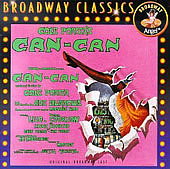 CAN CAN
CAN CAN
Music & Lyrics by Cole Porter
Book by Abe Burrows
Produced for the Broadway stage by Feuer and Martin
Shubert Theatre, Broadway 7 May, 1953 (892 perfs)
London Coliseum October 14, 1954 (394 perfs)
Synopsis
Can Can is a delightful show about Paris in the 1890s, a time remembered for artists, music, dance and most of all, love. The show concerns the lives, loves and pure zest for life of some of the more Bohemian citizens of Paris.
The show contains the famous "Garden of Eden" ballet and some entrancing Cole Porter songs such as "C'est Magnifique", "I Love Paris", "Allez-vous-en" and "Can Can" which flow logically for the context of the story.
Story
La Môme Pistache owns a café in Montmartre. One of the major attractions it offers is the scandalous dance. the can-can. The heroine is frequently in trouble with the law as a result.
As the show opens, the can-can girls are being release, yet again, from the court as a result of the reluctance of the police to testify against them. In frustration, Judge Aristide decides to go to the café himself to gather evidence. Meanwhile, Claudine, a laundry girl who moonlights as a can-can dancer, is fending off a pass from Hilaire, an art critic. Claudine is very much involved with s sculptor and does not want further problems. Aristide arrives at the café and he, and the owner, fall for each other. He does not reveal his identity and La Môme uses all her wiles to evade the prosecution of her girls. She bribes the police and names names. The judge's identity is revealed by the girls and in the middle of the can-can there is a flash from a camera - the judge has his evidence.
Meanwhile, Hilaire plans to hold an elaborate ball at the café. Claudine agrees to have dinner with him so that she can obtain a favourable review for her Sculptor friend, Boris. But, with the café girls and the proprietress locked up, can the ball go ahead? But, of course: all are released pending prosecution and Aristide, with an attack of conscience, urges Pistache to escape. He kisses her but there is another camera flash but this time it is the judge who provides the evidence. Next day, the newspapers print his photograph and, at the same time, Boris criticises Boris's work. Boris challenges Hilaire to a duel and promptly faints. Hilaire is shamed into writing an ecstatic review of Boris's work. Aristide is disbarred and ostracised by his legal colleagues. Pistache arranges for Aristide and herself to be arrested, to give him a chance to clear his name in court. Together, with the aid of the girls, they prove there is nothing wrong with a harmless little can-can.
Cast:
Male 15+; Female 7+ plus chorus and dancers
Principal Characters:
La Môme Pistache - Owner of the Bal du Paradis
Aristide Forestier - A Judge
Boris Adzinidzinadze - A Bulgarian sculptor
Claudine - A soubrette
Hilaire Jussac - An art critic
Théophile and Etienne - Parisians
Orchestration:
Violin 1, 2, 3 & 4, Viola; Cello; Reed 1, 2, 3, 4 & 5; Horn 1, 2 & 3; Trumpet 1 & 2; Trombone; Percussion; Guitar; Piano-Celeste
Musical Numbers:
- Allez-vous-en (Go Away)
- C'Est Magnifique
- Can-Can
- Come Along With Me
- Everyman Is a Stupid Man
- The Garden of Eden Ballet
- I Love Paris
- If You Loved Me Truly
- It's All Right With Me
- Live and Let Live
- Maidens Typical Of France
- Montmart'
- Never Give Anything Away
- Never Be An Artist
